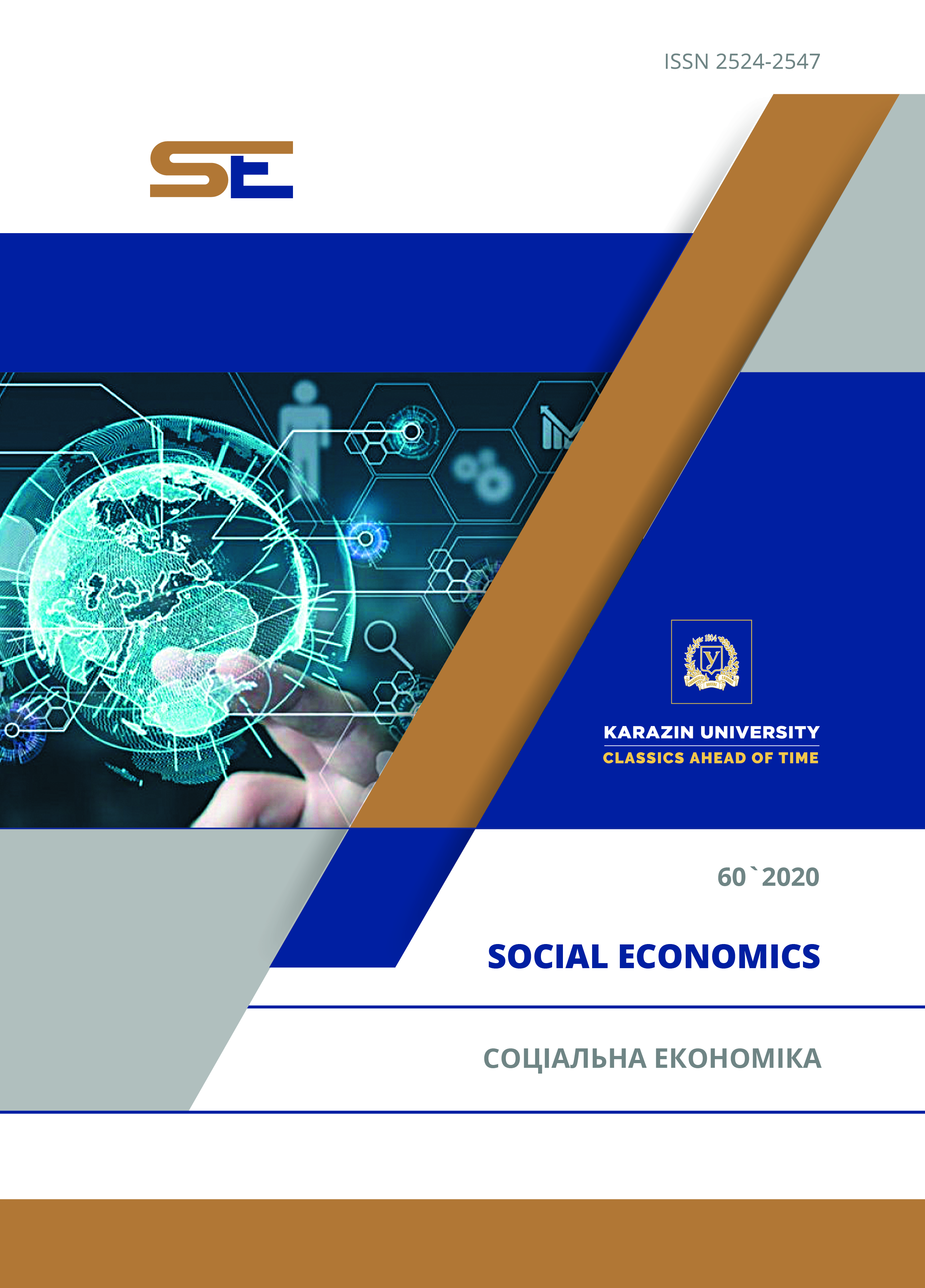CONCEPTUAL FOUNDATIONS OF “GREEN” ECONOMY IN THE CONTEXT OF SUSTAINABLE DEVELOPMENT
Abstract
The article focuses on defining the conceptual foundations of “green” economy in the context of sustainable development. The study analyzes is investigated the various interpretations of “green” economy, which are similar in content and do not contradict each other, but only reflect the point of view of various experts on the same problem. Different areas of the concept of “green” economics are considered, there were defined three components of it – economic, social, environmental. The relation between the conception of sustainable development and “green” economy is established. The dialectical method of cognition, the fundamental aspects of the concept of sustainable development have become the methodological basis of the study.
In recent years, the “green” economy approaches have been widespread in developed countries. However, in Ukraine government and the entrepreneurs do not pay enough attention to the development of the “green” economy, and national companies consider it as a restriction for their interests rather than an opportunity for the development of their businesses. The economic potential of the “green” economy indicated the necessity to increase “green” investment, involvement which will allow Ukraine to reach a new level of development. Among the directions of the “green” economy in Ukraine highlighted the rational use of natural resources, environmental protection, the formation of a new environmental behavior of the population, diversification of energy sources, modernization of housing and communal services, production of organic products.
Public authorities and local governments should develop a coordinated mechanism to stimulate domestic business to maximize the efficient use of natural resources in the production process. This should be done to stimulate the attraction of the necessary amount of investment resources within the framework of the implementation of the concept of a “green” economy. This can be manifested in the form of providing additional privileges for the purchase of innovative equipment that is not produced in the country, the attraction of foreign capital to the development of leading industrial enterprises.
Downloads
References
Bobrovska, N. V. (2018). Formation of ecological consciousness of society. Ecological and socio-economic aspects of economic development in the context of European integration. Mykolaiv, 18-21. (in Ukrainian)
Gura, A. O., & Gutsan, T. G. (2017). Green economy: essence, factors and prospects of development in Ukraine. Collection of scientific works of Kharkiv National Pedagogical University named after G. S. Frying pans “Economy”, 17, 42-52. (in Ukrainian)
Kvach, J. P., Firsova, K. V., & Borisov, O. G. (2015). “Green Economy”: possibilities for Ukraine. Global and national problems of economics, 6, 52-56. (in Ukrainian)
Makarenko, S. М., Oliinyk, N. М., & Rybachok, S. А. (2019). Improvement of state investment policy as the basis of implementation of innovative technologies on domestic enterprises. Economic innovations, 21, 3 (72), 62-70. doi:10.31520/ei.2019.21.3(72).62-70. (in Ukrainian)
Soloshich, I., & Pidlisnyuk, V. (2013). “Green economy” within framework of implementation of sustainable development in Ukraine. Scientific reports of National University of life and environmental Sciences of Ukraine, 6. Retrieved from http://nbuv.gov.ua/j-pdf/Nd_2013_6_1.pdf. (in Ukrainian)
Chmyr, O. S., & Zakharkevych, N. P. (2013). “Green” Economy: Essence, Aims and Basic Principles. Economic Herald of the Donbas, 3 (33), 54-62. (in Ukrainian)
Vanickova, R. (2020). Innovation Corporate Energy Management: Efficiency of Green Investment. Marketing and Management of Innovations, 2, 56-67. doi:10.21272/mmi.2020.2-04
Chygryn, O., Bilan, Y., & Kwilinski, A. (2020). Stakeholders of Green Competitiveness: Innovative Approaches for Creating Communicative System. Marketing and Management of Innovations, 3, 358-370. doi:10.21272/mmi.2020.3-26.
Holotová, M., Nagyová, Ľ., & Holota, T. (2020). The impact of environmental responsibility on changing consumer behaviour – sustainable market in Slovakia. Economics and Sociology, 13 (3), 84-96. doi:10.14254/2071-789X.2020/13-3/6.
Sokil, O., Zvezdov, D., Zhuk, V., Kucherkova, S., & Sakhno, L. (2020). Social and environmental costs: the impact of accounting and analytical support on enterprises’ sustainable development in Germany and Ukraine. Economic Annals-XXI, 181 (1-2), 124-136. doi:10.21003/ea.V181-11.
Pakurár, M., Khan, M. A., Benedek, A., & Oláh, J. (2020). The impact of green practices, cooperation and innovation on the performance of supply chains using statistical method of meta-analysis. Journal of International Studies, 13 (3), 111-128. doi:10.14254/2071-8330.2020/13-3/8.
Schusser, S., & Bostedt, G. (2019). Green behavioral (in) consistencies: are pro-environmental behaviors in different domains substitutes or complements? Environmental Economics, 10 (1), 23-47. doi:10.21511/ee.10(1).2019.03.
Pearce, D., Markandya, A., & Barbier, B. E. (1989). Blueprint for a green economy. London: Earthscan.
Vukovic, N. A. (2018). Green economy: definition and main directions of development. Bulletin of Ural Federal University. Series Economics and Management, 17, № 1, 128-145. doi:10.15826/vestnik.2018.17.1.006. (in Russian)
UNEP. (2011). Towards a “green” economy: Pathways to Sustainable Development and Poverty Eradication. (in Russian)
Danish Organisation for Renewable Energy. (n.d.). Retrieved from https://wiser.directory/organization/danish-organisation-for-renewable-energy-ove/.
Garlytska, D. A. (2017). Green economy construction as the main component of European integration of Ukraine. Economic Analysis, 27, № 2, 15-19. doi:10.35774/econa2017.02.015. (in Ukrainian)
Kucherov, A. V., & Shibileva, O. V. (2014). The Concept of a “green” economy: key issues and prospects of development. Young Scientist, 4, 561-563. (in Russian)
Paton, B. E. (Ed.). (2012). The national paradigm of sustainable development of Ukraine. Kiev. (in Ukrainian)
Boiarchuk, А. I., & Chabanov, D. V. (2019). Conceptual principles of management of “green” business taking into account experience of international financial management. Economic innovations, 21, 3 (72), 18-25. doi:10.31520/ei.2019.21.3(72).18-25. (in Ukrainian)
Prushkovskaya, E. V., & Shevchenko, Y. A. (2013). Development of “Green Economy”: National Aspect. Business Inform, 3, 186-191. (in Ukrainian)
EPI. (n.d.). Retrieved from https://epi.yale.edu/.
Gerasimchik, N. V., & Panchik, M. N. (2018). Principal-agent relationships in public-private partnerships. Topical issues of economic science in the XXI century. Gomel, 27-30. (in Russian)
Georgeson, L., & Maslin, M. (2019). Estimating the scale of the US green economy within the global context. Palgrave Communications, 5:121. doi:10.1057/s41599-019-0329-3.
State Statistics Service of Ukraine. (n.d.). Retrieved from http://www.ukrstat.gov.ua/. (in Ukrainian)
Makarenko, S. М., Oliinyk, N. М., & Sharapa, I. V. (2011). Production of ecologically clean products as basis of optimum strategy determination of regional business entity development. Economic innovations, 44, 156-160. (in Ukrainian)




